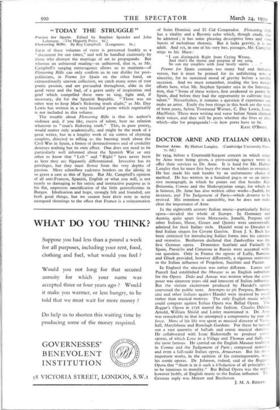"TODAY THE STRUGGLE" Poems for Spain. Edited by Stephen Spender
and John Lehmann. (The Hogarth Press. 6s.) Flowering Rifle. By Roy Campbell. (Longmans. 6s.) EAcia of these volumes of verse is presented frankly as a "document for our times," and will be handled cautiously by those who distrust the marriage of art to propaganda. But whereas an unbiassed reading—as unbiassed, that is, as Mr. Campbell's surging extravagance allows us to maintain—of Flowering Rifle can only confirm us in our dislike for poet- politicians, in Poems for Spain on the other hand, an extraordinarily uneven collection, we catch many notes of true poetic passion, and are persuaded throughout, alike in the good verse and the bad, of a grave unity of inspiration and grief which compelled these men to sing, fight and, if necessary, die for the Spanish Republic. "There was no other way to keep Man's flickering truth alight," as Mr. Day Lewis has written in a very beautiful poem which regrettably is not included in this volume.
The trouble about Flowering Rifle is that its author's violence and, if you like, excess of talent, bear no relation whatever to "man's flickering truth." This, in pure poetry, would matter only academically, and might be the mark of a great writer, but in a lengthy work of six cantos of rhyming couplets, directed to telling us the burning truth about the Civil War in Spain, a frenzy of destructiveness and of credulity destroys nothing but its own effect. One does not need to be particularly well informed about the Spanish War or any other to know that " Left " and " Right " have never been as here they are flippantly differentiated. Invective has its privileges, but they must flower from the very depths of passion. Mere schoolboy rudeness borders on the idiotic in so grave a case as this of Spain. But Mr. Campbell's opinion of all anti-Francos, Spanish, English or what you will, is not nearly so damaging to his satiric and instructive purpose as is his flat, unproven sanctification of the little generalissimo in Burgos. Idealisation and hope, strongly felt and founded, are both good things, but we cannot hear their note in noisy unargued shoutings to the effect that Franco is a reincarnation
of Saint Dominic and El Cid Campeador. Flowering Rifle has a vitality and a Byronic echo which, though crude, may be admired ; it has some pleasing descriptive lines and some bursts of melodious rhetoric. But it lacks gravity, it is not adult. And yet, in one of his very bes:. passages, Mr. Campbell sings to his Muse : "I can distinguish Right from Crying Wrong, And that's the theme and purpose of my song. So sun my couplets with your lovely smiles . . ."
Poems for Spain contains too many bad and imitative verses, but it must be praised for its unfaltering note of sincerity, for its sustained mood of gravity before a terrible occasion. And we must remember, reading the less mature efforts here, what Mr. Stephen Spender says in the Introduc- tion, that "Some of these writers, first awakened to poetry by Spain, died before they had the opportunity to cultivate their talent." Nevertheless, it remains a question if experience can make an artist. Easily the best things in this book are the work of born poets, Sylvia Townsend Warner, C. Day Lewis, Louis MacNeice. These were writing real verse before Spain claimed their voices, and they will be poets whether she lives or dies. which—alas for propaganda!—is how poets have to be.
KATE O'BRIEN.














































 Previous page
Previous page